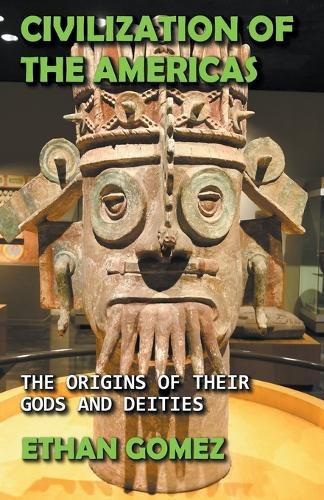Readings Newsletter
Become a Readings Member to make your shopping experience even easier.
Sign in or sign up for free!
You’re not far away from qualifying for FREE standard shipping within Australia
You’ve qualified for FREE standard shipping within Australia
The cart is loading…






This title is printed to order. This book may have been self-published. If so, we cannot guarantee the quality of the content. In the main most books will have gone through the editing process however some may not. We therefore suggest that you be aware of this before ordering this book. If in doubt check either the author or publisher’s details as we are unable to accept any returns unless they are faulty. Please contact us if you have any questions.
There is much more to Mesoamerica than the Aztec, Mayan, and Toltec civilizations. In fact, several different ancient Mesoamerican civilizations had their own gods and religious beliefs. These civilizations included the Olmec civilization, Zapotec civilization, Teotihuacan civilization, Maya civilization, Toltec civilization, and Aztec civilization.
The Olmec civilization is the first known Mesoamerican civilization. The name Olmec comes from the Nahuatl word for rubber people, and they were pre-Columbian people living in what is now southern Mexico, in the modern-day states of Veracruz and Tabasco. The Olmecs are essential to history because they were the first Mesoamerican people to develop a writing system, use hieroglyphics, and construct significant stone monuments (such as pyramids).
The calendar developed by the Olmecs was one of their most remarkable achievements. They based their calendar on 365 days divided into 18 months of 20 days each plus 5 extra days at the end of each year–so it was different from our current calendar! They also used zero as part of their number system, which is why we still use it today!
The Zapotec civilization was in the Oaxaca Valley, Mexico. This Mesoamerican civilization was known for using the Mesoamerican writing system and art.
The Zapotecs were one of the first civilizations in Mexico to develop a writing system. They used it to write on stone or pottery, but we don’t know what their language sounded like because no one left any written records about them or their lives, so all that remains is physical evidence, like pottery with pictures and hieroglyphs carved into it. This type of evidence is called epigraphic because it’s an inscription on something else (like a statue).
The city of Teotihuacan was a center of trade and politics. It existed from about 300 BC until 600 AD when it was abandoned. The site has been a subject of archaeology since the 19th century; it is now an essential source of information on Mesoamerican civilization, among the most significant early cities in pre-Columbian America.
$9.00 standard shipping within Australia
FREE standard shipping within Australia for orders over $100.00
Express & International shipping calculated at checkout
This title is printed to order. This book may have been self-published. If so, we cannot guarantee the quality of the content. In the main most books will have gone through the editing process however some may not. We therefore suggest that you be aware of this before ordering this book. If in doubt check either the author or publisher’s details as we are unable to accept any returns unless they are faulty. Please contact us if you have any questions.
There is much more to Mesoamerica than the Aztec, Mayan, and Toltec civilizations. In fact, several different ancient Mesoamerican civilizations had their own gods and religious beliefs. These civilizations included the Olmec civilization, Zapotec civilization, Teotihuacan civilization, Maya civilization, Toltec civilization, and Aztec civilization.
The Olmec civilization is the first known Mesoamerican civilization. The name Olmec comes from the Nahuatl word for rubber people, and they were pre-Columbian people living in what is now southern Mexico, in the modern-day states of Veracruz and Tabasco. The Olmecs are essential to history because they were the first Mesoamerican people to develop a writing system, use hieroglyphics, and construct significant stone monuments (such as pyramids).
The calendar developed by the Olmecs was one of their most remarkable achievements. They based their calendar on 365 days divided into 18 months of 20 days each plus 5 extra days at the end of each year–so it was different from our current calendar! They also used zero as part of their number system, which is why we still use it today!
The Zapotec civilization was in the Oaxaca Valley, Mexico. This Mesoamerican civilization was known for using the Mesoamerican writing system and art.
The Zapotecs were one of the first civilizations in Mexico to develop a writing system. They used it to write on stone or pottery, but we don’t know what their language sounded like because no one left any written records about them or their lives, so all that remains is physical evidence, like pottery with pictures and hieroglyphs carved into it. This type of evidence is called epigraphic because it’s an inscription on something else (like a statue).
The city of Teotihuacan was a center of trade and politics. It existed from about 300 BC until 600 AD when it was abandoned. The site has been a subject of archaeology since the 19th century; it is now an essential source of information on Mesoamerican civilization, among the most significant early cities in pre-Columbian America.